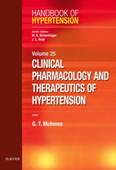This volume reviews comprehensively the present understanding of the clinical pharmacology and therapeutics of
currently available antihypertensive agents. As fewer new molecules are entering development it becomes increasingly
important to utilise existing drugs in a way that exploits their full potential through a greater understanding of
their molecular biology and pharmacogenomics.
Section I: General considerations:
Classification of antihypertensive drugs and pharmacological considerations. Interaction of antihypertensive drugs with
mechanisms of blood pressure regulation. Antihypertensive drugs: pharmacokinetics, pharmacodynamics, metabolism, side
effects and drug interactions. Antihypertensive drugs: hemodynamic effects.
Section II: Diuretics:
Thiazides and loop diuretics. Aldosterone antagonists
Section III: Centrally acting drugs:
Methyldopa and imidazolone agonists.
Section IV: Vasodilator drugs:
Alpha-blocking drugs. Calcium channel blockers. Potent vasodilators.
Section V: Beta-blocking agents:
Beta-adrenoceptor blocking drugs.
Section VI: Drugs acting on the renin-angiotensin system:
Angiotensin converting enzyme inhibitors. Angiotensin receptor blockers. Vasopeptidase inhibitors.
Section VII: Future prospects:
Novel agents in development.
Section VIII: Clinical trials:
The evidence-base for treatment of hypertension.
Section IX: Therapeutic strategies:
Combination therapy. Sequential monotherapy.
Section X: Special patient groups:
Pregnancy. The elderly. Hypertension and diabetes. Ethnic considerations in hypertension.


